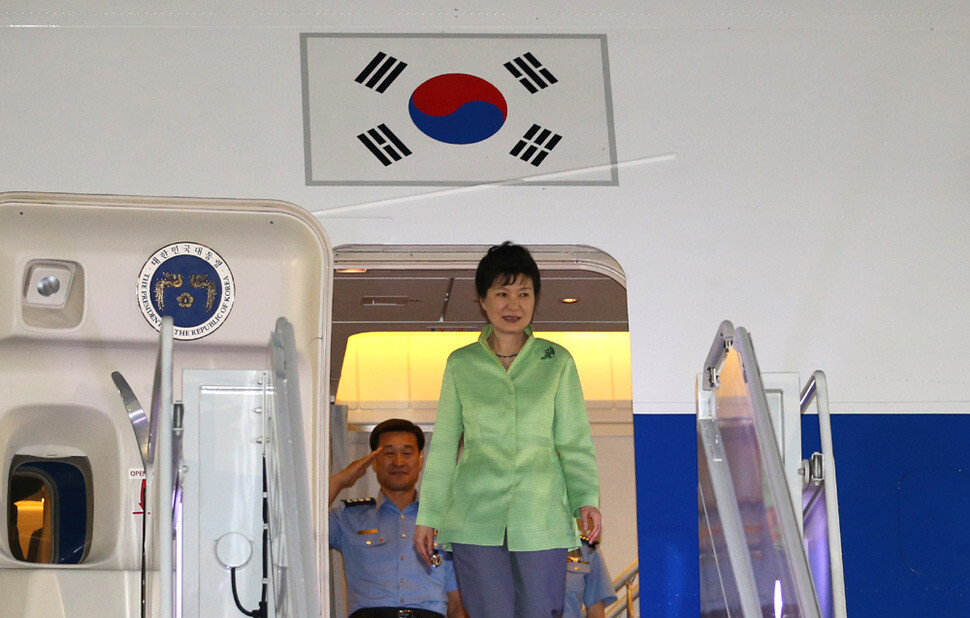hankyoreh
Links to other country sites 다른 나라 사이트 링크
Worries in the US that Seoul is getting too close to Beijing?

Many of the questions President Park Geun-hye and US President Barack Obama fielded in their post-summit joint press conference on Oct. 16 had to do with the South Korea-US alliance and Seoul’s relations with Beijing.
“President Park, you recently appeared in Beijing with the leaders of Russia and China. What message were you trying to send to the US with that appearance?” asked one reporter.
“[T]here are some people who are concerned that there are some cracks [in the South Korea-US alliance]. What do you see?” another asked Obama.
Obama himself noted during the press conference that “sometimes there’s a perception that if President Park meets with President Xi, that that must cause a problem for us” -- although he hastened to add that he didn’t agree with that perception.
The questions and remarks are evidence of just how strongly observers in the US believe that Seoul may be becoming too friendly with China. These perceptions have also been seen as one reason Park decided on the Center for Strategic and International Studies (CSIS) among Washington’s numerous think tanks as the setting for a speech detailing her own foreign policy during her visit.
“CSIS, and especially figures involved in Korean Peninsula policy under the [George W.] Bush administration like Michael Green and Victor Cha, has been one of the chief forces out there arguing that South Korea has become too China-friendly and blaming South Korea for the poor state of its relations with Japan,” noted Yonsei University professor Moon Chung-in.
A former senior government official said the reaction from Washington was “somewhat to be expected, given that the US is our only alliance and China is not an ally.”
“The question is what South Korea has to do to strike a suitable balance between Washington and Beijing without losing its way, when the situation with US-China relations has become so delicate people are calling it a ‘new cold war,’” the former official added.
Inje University professor Kim Yeon-chul said the problem was that “the things Park says in China aren’t supplementing the things she says in the US -- they‘re conflicting with them.”
“The danger there is engendering distrust from both sides,” Kim warned.
The fear is that the Park administration, which has consistently emphasized “trust-based diplomacy,” could end up facing a crisis of trust. This also explains concerns over remarks made by Park during her US visit, during which she described South Korea as a “key partner” in Washington’s “rebalancing Asia” policy and calling for “expand[ing the South Korea-US alliance’s] history of miracles to all of the peninsula.”
“To achieve a balance between the US and China, South Korea needs to come up with a creative agenda all its own,” said a former senior government official.
“That kind of creative diplomacy where Seoul takes the initiative is not going to be possible unless it beefs up its diplomatic resources by improving relations with Pyongyang and making progress on the North Korean nuclear issue,” the former official cautioned.
By Lee Je-hun, staff reporter
Please direct questions or comments to [english@hani.co.kr]

Editorial・opinion
![[Column] Has Korea, too, crossed the Rubicon on China? [Column] Has Korea, too, crossed the Rubicon on China?](https://flexible.img.hani.co.kr/flexible/normal/500/300/imgdb/original/2024/0419/9317135153409185.jpg) [Column] Has Korea, too, crossed the Rubicon on China?
[Column] Has Korea, too, crossed the Rubicon on China?![[Correspondent’s column] In Japan’s alliance with US, echoes of its past alliances with UK [Correspondent’s column] In Japan’s alliance with US, echoes of its past alliances with UK](https://flexible.img.hani.co.kr/flexible/normal/500/300/imgdb/original/2024/0419/2317135166563519.jpg) [Correspondent’s column] In Japan’s alliance with US, echoes of its past alliances with UK
[Correspondent’s column] In Japan’s alliance with US, echoes of its past alliances with UK- [Editorial] Does Yoon think the Korean public is wrong?
- [Editorial] As it bolsters its alliance with US, Japan must be accountable for past
- [Guest essay] Amending the Constitution is Yoon’s key to leaving office in public’s good graces
- [Editorial] 10 years on, lessons of Sewol tragedy must never be forgotten
- [Column] A death blow to Korea’s prosecutor politics
- [Correspondent’s column] The US and the end of Japanese pacifism
- [Guest essay] How Korea turned its trainee doctors into monsters
- [Guest essay] As someone who helped forge Seoul-Moscow ties, their status today troubles me
Most viewed articles
- 1[Column] The clock is ticking for Korea’s first lady
- 2Hong Se-hwa, voice for tolerance whose memoir of exile touched a chord, dies at 76
- 3After 2 months of delayed, denied medical care, Koreans worry worst may be yet to come
- 4[Column] Has Korea, too, crossed the Rubicon on China?
- 5Samsung barricades office as unionized workers strike for better conditions
- 6US overtakes China as Korea’s top export market, prompting trade sanction jitters
- 7All eyes on Xiaomi after it pulls off EV that Apple couldn’t
- 8[Guest essay] How Korea turned its trainee doctors into monsters
- 9[Editorial] As it bolsters its alliance with US, Japan must be accountable for past
- 10[Correspondent’s column] In Japan’s alliance with US, echoes of its past alliances with UK